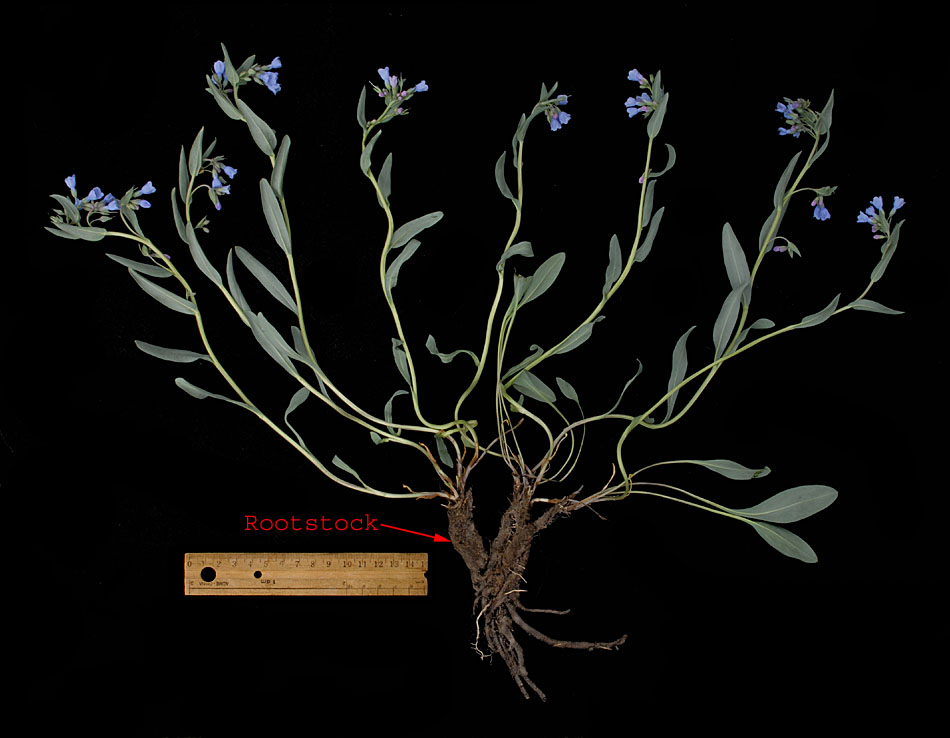Mertensia lanceolata

Lance-Leaved Lungwort
Whole Plant
Oro Lake Regional Park
19-May-2007
Note that the key to the species in Budd's
Flora requires "plants with taproot; NOT [plants with tuberous
roots]". In fact, the stems arise from a rootstock.
Note that the key to the species in Budd's
Flora requires "flowers 10-15 mm long; NOT [flowers 15-25
mm long]", while the key to the genera in the same flora requires
"flowers smaller than 12-18 mm long". The flowers of the
specimen illustrated here are about 12 or 13 mm long.
Note also that the key to the species in Budd's
Flora requires "plants pubescent; NOT [plants entirely
glabrous]", while the key to the species in Flora of Alberta
requires "stems glabrous; NOT [stems pubescent]". Both these
statements are correct. The stems are glabrous, but the leaves are
scantily strigose. Finally, the key to the genera in Flora of Alberta
requires "plants usually rough-hairy; NOT [plants
glabrous]". This species is not really rough hairy.
 | Lanceolata: Answers to key questions in
Budd's Flora (BF) and Flora of Alberta (FOA) leading to this species.
 |
plants with taproot; NOT [plants with
tuberous roots] |
 |
plants 10-30 cm high; NOT [plants 30-70
cm high] (BF) |
 |
plant usually less than 40 cm high (FOA) |
 |
plants pubescent; NOT [plants entirely
glabrous] (BF) |
 |
stems glabrous; NOT [stems pubescent]
(FOA) |
 |
stem leaves 2-10 cm long; NOT [stem
leaves 5-15 cm long] |
 |
stem leaves mostly oblong-lanceolate; NOT
[stem leaves elliptical], NOT [stem leaves ovate to ovate-lanceolate] |
 |
cauline leaves without distinct lateral
veins |
 |
flowers 10-15 mm long; NOT [flowers 15-25
mm long] (BF) |
 |
corolla-tube only slightly if at all
longer than the throat and limb; NOT [corolla-tube at least twice as
long as the throat and limb]
|
|
 | Mertensia: Answers to key questions in
Budd's Flora (BF) and Flora of Alberta (FOA) leading to this genus.
 |
plants smaller than to 1 m high |
 |
plants usually rough-hairy; NOT [plants
glabrous] (FOA) |
 |
leaves alternate; NOT [leaves opposite or
in whorls of 3] |
 |
flowers in cymes; NOT [flowers axillary] |
 |
flowers in non-leafy cymes, with or
without small bracts; NOT [flowers in leafy cymes] |
 |
cymes bractless or only the lowest
flowers with bracts; NOT [cymes bracteolate to the tip] |
 |
flowers several-many; NOT [flowers mostly
solitary (2-4)] |
 |
inflorescence more or less congested; NOT
[inflorescence elongate, flowers distant] |
 |
flowers smaller than 12-18 mm long (BF) |
 |
flowers blue; NOT [flowers white, yellow,
purplish or reddish purple] |
 |
corolla tubular-funnelform; NOT [corolla
rotate] |
 |
corolla 1 cm long or more; NOT [corolla
less than 1 cm long] |
 |
ovary deeply 4-lobed, the style arising
from the center between the lobes; NOT [ovary merely grooved, the style
arising from the summit of the ovary] |
 |
nutlets lacking hooked prickles |
|
 | Boraginaceae: Answers to key questions in
Budd's Flora leading to this family.
 |
herbs; NOT [shrubs or trees] |
 |
plants NOT twining |
 |
plants green or with some chlorophyll;
NOT [plants parasitic or saprophytic, without chlorophyll] |
 |
plants WITHOUT milky juice |
 |
flowers NOT in heads or spikes; NOT
[flowers in long or short spikes], NOT [flowers in heads or in form
resembling a head] |
 |
inflorescence usually scorpioid |
 |
flowers with two floral rings, but with
the petals wholly or partly united forming a tube or bell] |
 |
corolla regular; NOT [corolla irregular] |
 |
stamens alternating with corolla lobes,
or twice their number; NOT [stamens directly in front of corolla lobes] |
 |
stamens 4 or 5; NOT [stamens 8 or 10] |
 |
ovary superior; NOT [ovary inferior] |
 |
styles from center of lobes of ovary; NOT
[style terminal] |
 |
fruit with 4 nutlets; NOT [fruit a berry
or capsule] |
|

